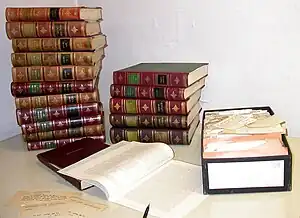
Schweizerisches Idiotikon ("the Swiss idioticon",[1] also known as Wörterbuch der schweizerdeutschen Sprache "Dictionary of the Swiss German language") is an ongoing, major project of lexicography of the Swiss German dialects. Publication began in 1881 and is projected to be complete by 2022. Its scope includes the language since the end of the classical Middle High German period (13th century) and as such also represents the historical dictionary of the dialects of German-speaking Switzerland, and is one of the most detailed treatments of the Early Modern High German language in general. As of 2010, it contains 150,000 words.[2]
The history of the project began in 1862 with the foundation of a Verein für das Schweizerdeutsche Wörterbuch, led by Friedrich Staub (1826–1896). Originally envisaged as a dictionary in four volumes, the first fascicle was published in 1881. From 1896, the project was led by Albert Bachmann (1863–1934), under whose editorship, the scope and depth of the project was greatly expanded; Bachmann endeavored to put the Idiotikon on the level with the other "national dictionary" projects edited in Germanic Europe at the time, the Deutsches Wörterbuch, Woordenboek der Nederlandsche Taal, Oxford English Dictionary and Svenska Akademiens ordbok. In this sense, the Idiotikon is the "national dictionary" of Alemannic Switzerland.
After Bachmann's death in 1934, the project was led by five editors-in-chief: Otto Gröger (1934–1951), Hans Wanner (1951–1974), Peter Dalcher (1974–1991), Peter Ott (1991–2005), Hans-Peter Schifferle (2005–2019), Hans Bickel (2019–2022) and Christoph Landolt (2022–present).
By 2012, 16 volumes had been published, covering the alphabet up to X. Volume 17, projected as the final volume, appears continuously. All published portions have been publicly accessible online since 2010 at idiotikon.ch.
References
- ↑ the term idioticon "dictionary of a vernacular" is a learned 18th-century coinage, derived from the Greek ἰδιώς "characteristic" (whence also idiot), therefore Idioticon literally means ″index of words which are characteristic for a certain dialect″. See: Walter Haas (ed.): Provinzialwörter. Deutsche Idiotismensammlungen des 18. Jahrhunderts, Berlin−New York 1994.
- ↑ ""Tschegge" und "Tröpsli" online nachschauen". 2010-10-05. Retrieved 2022-03-10.
- Jahresberichte des Vereins für das Schweizerdeutsche Wörterbuch (different titles), 1868 sqq.
- H. Wanner: Das Schweizerdeutsche Wörterbuch. Schweizerisches Idiotikon. Wörterbuch der schweizerdeutschen Sprache. In: Zeitschrift für Dialektologie und Linguistik. Beihefte N. F. 17 (1976), pp. 11–24.
- W. Haas: Das Wörterbuch der schweizerdeutschen Sprache. Versuch über eine nationale Institution. Frauenfeld 1981.
- R. Trüb: Das Schweizerdeutsche Wörterbuch und die schweizerdeutschen Wörterbücher. Lexikographie als Daueraufgabe. In: Schweizerdeutsches Wörterbuch. Bericht über das Jahr 1987, pp. 12–25.
- H.-P. Schifferle: Wörterbuch der schweizerdeutschen Sprache. In: Wissenschaftliche Lexikographie im deutschsprachigen Raum, im Auftrag der Heidelberger Akademie der Wissenschaften hg. von Thomas Städtler, Heidelberg 2003, pp. 341–354.
- Ch. Landolt: Das Schweizerische Idiotikon – ein diachrones Wörterbuch der schweizerdeutschen Sprache. In: Mitteilungen des Deutschen Germanistenverbandes 57/4 (2010): Historische Lexikographie des Deutschen, ed. by Holger Runow, p. 410–418.
- Ch. Landolt, T. Roth: Schweizerisches Idiotikon – Wörterbuch der schweizerdeutschen Sprache. In: Germanistische Dialektlexikographie zu Beginn des 21. Jahrhunderts (= ZDL-Beihefte. Vol. 181). Ed. by Alexandra N. Lenz and Philipp Stöckle. Steiner, Stuttgart 2021, ISBN 978-3-515-12911-4, pp. 143–173.